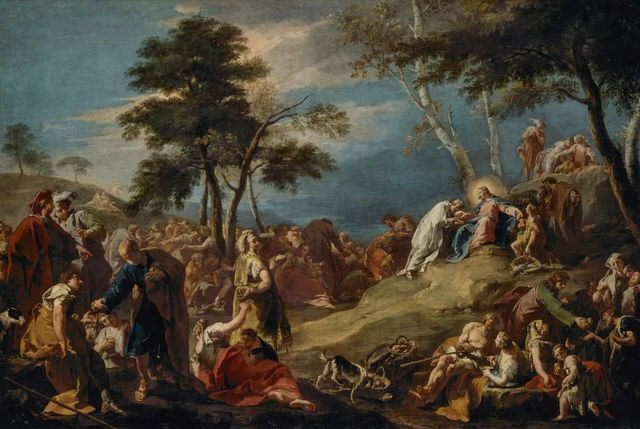When we receive the Eucharist, we are met with the love of God and find rest for our souls.
Gospel Passage: Luke 9:11b-17
Jesus spoke to the crowds about the kingdom of God and healed those who needed to be cured. The day was drawing to a close, and the twelve came to him and said, ‘Send the crowd away, so that they may go into the surrounding villages and countryside, to lodge and get provisions; for we are here in a deserted place.’ But Jesus said to them, ‘You give them something to eat.’ They said, ‘We have no more than five loaves and two fish—unless we are to go and buy food for all these people.’ For there were about five thousand men. And Jesus said to his disciples, ‘Make the people sit down in groups of about fifty each.’ They did so and made them all sit down. And taking the five loaves and the two fish, he looked up to heaven, and blessed and broke them, and gave them to the disciples to set before the crowd. And all ate and were filled. What was left over was gathered up, twelve baskets of broken pieces.

Reflections
If we had to summarize today’s Gospel in one word, it would be the word “Providence.” Today is also the celebration of the Most Holy Body and Blood of Christ. So, while on this day we would expect to hear a Gospel reading about the Last Supper, when Jesus institutes the Eucharist, today’s verses instead tell us of the context within which Jesus established the sacrament of the Eucharist.
In Bethsaida, by the sea of Galilee, Jesus worked tirelessly to teach the people the whole entire day about the Kingdom of God (Luke 9:10). He healed them of their sickness, which was a foretaste of heaven without pain and suffering. The grace of healing was a miraculous sign that accompanied his presence. And, for those who did not have a physical ailment, but a persistent longing to hear the Word, the divine Logos, which was the majority of those gathered around Jesus, he provided another type of miracle: The multiplication of the two fish and the five loaves, with which he would satisfy their hunger. This sign tells us that the kingdom of God is found in the fulfillment of God’s will. To seek God’s will arrives through a feeling of hunger, not just physical hunger. While some people may call this need a hunger and thirst for meaning, we may also include the longing for truth, justice, mercy, and peace, and ask ourselves: Who among us has not experienced this type of need?
Jesus spent all day with the people, and by the end of the day, the apostles realized that they were all hungry and tired. They came to Jesus and implored him, “Send the crowd away, so that they may go into the surrounding villages and countryside, to lodge and get provisions; for we are here in a deserted place” (Luke 9:12). They all needed a break to go into the nearby villages to buy food for themselves and for their families. The apostles were very practical and realized that something needed to be done concretely to help them avoid getting overly exhausted in the hot sun with no water or food provisions. But Jesus said, “No.” He said, “You give them something to eat.” (Luke 9:13). So, right away, as practical as the disciples’ minds worked, they tried to figure out a way of how this could be feasible: Should they go and buy food for all these people to eat? Has anyone brought something with them that they could share? They soon realized that the first option was impossible; they had not enough money or manpower to buy and serve so much food. The second option seemed equally unfeasible: there was only one boy, most likely Peter’s son, who was smart enough to bring along two fish and five loaves for dinner. But what was that for five thousand men and their families? Should they take away the food from the child and divide it amongst the men? There was no way of satisfying everyone’s hunger.
So, Jesus did a seemingly impossible task. He asked the disciples to make everyone sit down, “…in groups of about fifty each” (Luke 9:15), forming one hundred groups. Then, looking up to heaven, he blessed the bread and the fish, broke them, and gave them to the disciples to set them before the people. “And all ate and were filled. What was left over was gathered up, twelve baskets of broken pieces” (Luke 9:17). Five cakes of bread became over five thousand loaves, and the two fish became at least two thousand pieces of fish. Although the amount of food was at least one thousand times the original amount, Jesus did not add, or multiply. He did not use the quadratic formula to solve the amount of food required to feed five thousand men and their families. He looked up to Heaven and prayed. And from God’s Providence, there was such an abundance, that the people were fully satisfied and the leftovers were gathered and stored for another day.
The disciples learned that, in the wisdom of God, what is given away is not only added, multiplied, logarithmically increased or quadratically equated to the number of people and their needs, but overflows to satisfy every need. The people witnessed this in advance to grasp that at the Last Supper, when Jesus said, “’Take this and divide it among yourselves,’” (Luke 22:17), this tiny item, in the form of bread and wine, contained the whole life of Jesus, the abundant rationale and context of the Divine love and care, to be shared with all. This is what we receive when we reach out to accept the host, the Eucharist, the Holy Body, and the sip of wine, the Holy Blood of Christ—the abundance of life in God that fills one and all, completely, and more. In this tiny, miraculous bread from heaven, we are met with the love of God and find rest for our souls.
